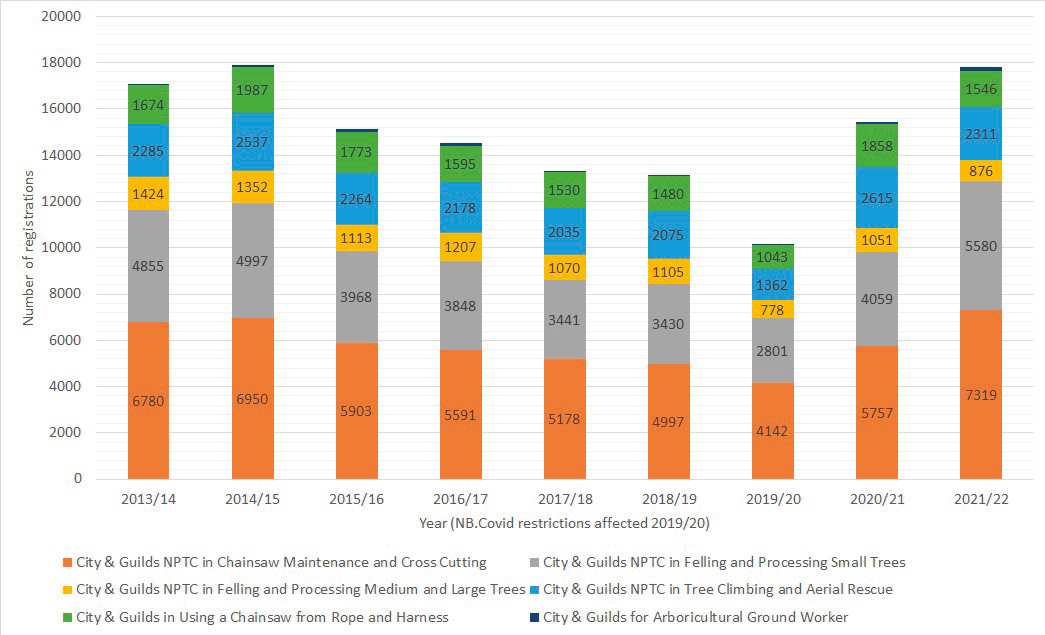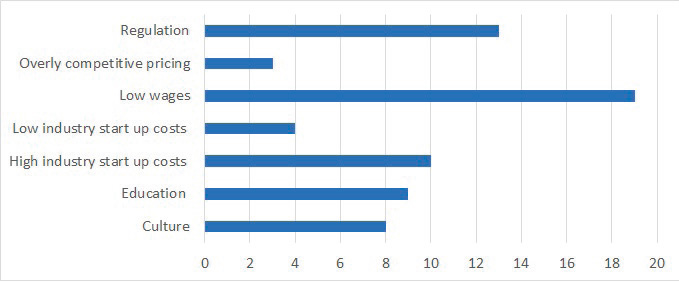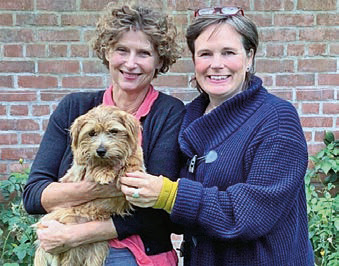Beccy Blackman and Kate Holbrook
This was the question we asked in the spring ’23 edition of this magazine; you can read the article on the Association’s website or using the QR code below. We wanted to discuss the supply-side issues around employing qualified climbing arborists and why this appears to most employers to have become more difficult in recent years.
We also asked stakeholders to give us their opinion on what the industry at large felt was happening. We can now feedback the varied responses we received and respond to some of the unanswered questions with regard to whether the numbers of candidates passing competency-based certificates over the last 10 years have fallen.
Are the numbers of qualified arborists entering the industry falling?
We thought it would be useful to know whether the numbers of people gaining chainsaw and aerial competency certificates were falling. Helpfully, City & Guilds have supplied some data about the uptake of their NPTC practical arb certificates over the last decade (Figure 1).
We also heard back from Lantra who reported that ‘between 1st January 2013 and 31st December 2022, registrations on arb-related training courses increased by 87%. During 2020 and covid, registrations on training courses fell by 25% but these quickly recovered in 2021 back to pre-covid levels and rose again on a similar growth trajectory to take us to the final position of 87% growth in learner numbers for the decade.’
So, whilst there was an obvious slump in numbers because of covid restrictions in 2019/20, these figures do not show a significant downwards trend.
If numbers are not decreasing, are we an industry of more self-employed people than in the past?
In our opinion, we think so. As stated in our article in the spring edition, it is relatively straightforward for an arborist to supply their services on a labour-only basis and rightly (or wrongly) this appears to be more attractive to them that the alternative PAYE rate and fixed working days on offer. Employers will need to make packages more attractive with higher pay and more flexibility to fill PAYE roles or reconcile themselves to filling positions with a bank of self-employed arborists.
What was the response to our article?
Feedback from our article was varied and came through our Typeform link, email, Instagram, LinkedIn, Arbtalk and Facebook. We have done our best to capture it and make it useful (Figure 2).
It is not always easy to glean data from open feedback but taking the topics in turn, the overall sentiment was:
Regulation:
Most who commented felt strongly that the sector should be regulated in a way that other dangerous trades are (gas and electricity were mentioned) but a couple felt that this might play into the hands of larger companies to the detriment of smaller operations.
Overly competitive pricing:
Concerns were raised about how difficult it is to cover all costs when winning work can involve a race to the bottom.

Figure 1: The number of City & Guilds arb qualification registrations by year, 2013–2022.

Figure 2: Topics covered in feedback to our article.
Low wages:
This was the most-cited perceived industry issue. These responses seemed to come mostly from arborists rather than those paying the wages, but some company owners commented that it was hard to raise wages and win work at the same time. There were also some technical arborists who commented that their skills level in many/any other industries would be much better remunerated.
Low industry start-up costs:
These comments came from business owners saying that it was too easy for competitors to start in the industry as, relatively speaking, the amount of equipment needed was not a barrier to entry.
High industry start-up costs:
This was mostly individuals (and even their parents) saying that the cost of getting qualifications and the necessary kit to become a climbing arborist was prohibitive.
Education:
The issue of competency tickets being able to be taken separately from academic learning was raised; sometimes students don’t finish their course once they have achieved their competency certificates, risking an industry of qualified climbers with insufficient botanical knowledge (which does not help with succession overall). There was also a feeling that education was not promoted enough in arb and that there should be a more structured approach to working towards getting off the tools into other arb roles when the time is right. Lack of professionalism and the public perception of the industry came up here too.
Culture:
The culture of flexibility in days worked was mentioned as a benefit of the industry. Several commented that there is a culture that does not support growth; that more seasoned climbers do not encourage those with less experience for fear of losing work to them in future. There was also a general feeling that the industry lacks understanding of and engagement with future opportunities, which limits potential growth.
Have other countries got any answers we might find useful?
It may not be relevant to discuss the global situation here and many countries wouldn’t be comparable to the UK but the situation in Europe and the USA doesn’t look very different, with reports of falling employment numbers and an ageing workforce. We are the sole UK agent for a large Australian arb employer, and we know that they have similar issues.
Where will the next generation of arborists come from if things continue in this way?
Arboriculture is an industry that is vital and here to stay. In an ideal world today’s climbing arborists contribute to the numbers of tomorrow’s managers, tree officers and surveyors, so we need to keep feeding the system with new arborists who are supported and advised along each step in their arb career. This career journey needs signposting clearly with affordable options for further learning and career advancement so that the 35-year-old climbing arborist can plan for another 30 years in the industry they chose at 17.
What can we do to help?
We were so pleased to read the article by Michelle Ryan, Chair of the Association, in the last ARB Magazine. As she said, there are lots of people trying to help the situation, but it needs joined up thinking. It was great to read in her report that the Association is taking the lead on the succession issue and will be updating the arb industry on how its community can help. Have a read if you missed it (via the Members’ Area of the Association’s website – www.trees.org.uk). See also the report on page 10 of this issue, on the stakeholder meeting held recently.
From offering opportunities to the less experienced to promoting the industry locally in schools, there’s something everyone can do and we’re sure that with the Association at the helm, the industry will benefit from the extra energy and promotion created.

Beccy Blackman and Kate Holbrook from CTC Recruitment Ltd.
Thanks for reading and, as ever, we’re interested in your opinion so do ping us if you have one to share.
Email: admin@ctcrecruitment.co.uk
This article was taken from Issue 202 Autumn 2023 of the ARB Magazine, which is available to view free to members by simply logging in to the website and viewing your profile area.